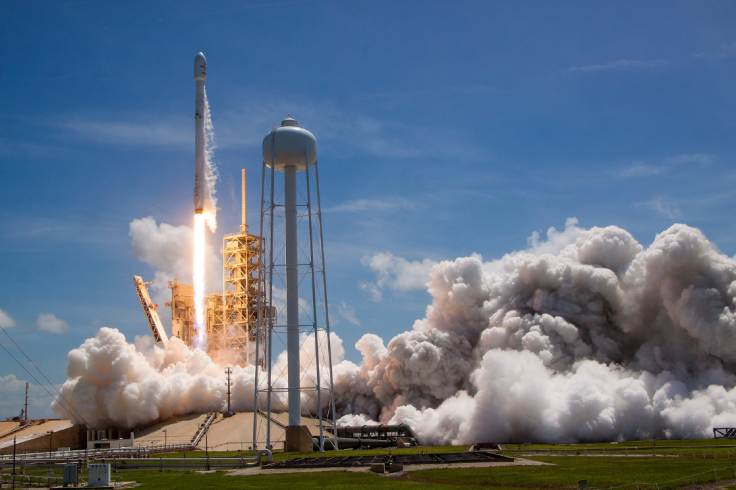Watch SpaceX make history with its second successful rocket launch and landing in one weekend
The Sunday launch marked the ninth one for SpaceX in 2017 - the most completed in a single year.

SpaceX made history on Sunday (25 June) by successfully pulling off back-to-back Falcon 9 rocket launches and landings in roughly 48 hours. After launching Bulgaria's first communications satellite into orbit from the Kennedy Space Center in Florida on Friday, SpaceX nailed its "weekend doubleheader" with another successful launch from California's Vandenberg Air Force on Sunday.
The rocket lifted off at 4:25pm EST and delivered a payload of 10 Iridium NEXT satellites into orbit. The launch marked the ninth one for SpaceX in 2017 - the most completed by the space transportation company in a single year.
The Falcon 9 rocket for the mission sported redesigned, larger titanium hypersonic grid fins designed to withstand the heat of reentry without shielding and help guide the returning booster despite strong winds. The rocket's first stage separated 2.5 minutes after launch and made its way back towards Earth.
Prior to launch, CEO Elon Musk warned that the landing would be tricky due to weather conditions.
"Launch at 1:25 delivering 10 satellites for Iridium. Droneship repositioned due to extreme weather. Will be tight," Musk tweeted.
However, the rocket safely touched down on the drone ship "Just Read the Instructions" in the Pacific Ocean. The successful landing also marked SpaceX's 13th successful one this year.
"New titanium grid fins worked even better than expected. Should be capable of an indefinite number of flights with no service", Musk tweeted after the launch.
An hour after launch, all 10 Iridium NEXT satellites were successfully deployed to low-Earth orbit. The Sunday launch was SpaceX's second delivery for Iridium Communications after it successfully launched 10 satellites in January. There are six more Iridium Next missions scheduled over the next year.
"SpaceX has been a disruptor of the long-time status quo of the commercial space industry," Iridium chief Matt Desch said, CNBC reports. "They are redefining the 'cost to get to space,' and all the other launch providers have had to take note and adjust their plans."
Successful deployment of 10 @IridiumComm NEXT satellites to low-Earth orbit confirmed.
— SpaceX (@SpaceX) June 25, 2017
On Friday, SpaceX used a previously flown rocket booster that was used in a January mission. The mission on Sunday did not use a pre-flown booster. However, its safe recovery could see it potentially being reused in a future mission.
SpaceX crossed multiple milestones this weekend with the launches marking the company's fastest turnaround yet. It also highlighted its goal to recover, refurbish and reuse hardware to cut down on launch costs.
"We tried to work with other launch vehicle companies but all were at least twice the cost of SpaceX and unaffordable based on the scope of the network we needed to launch," Desch said. "I'll be on them Monday to make sure our next six launches over the next 12 months are equally successful. SpaceX isn't 'done' yet."
Earlier this year, SpaceX president Gwynne Shotwell said the firm plans to launch its Falcon 9 rockets every two to three weeks.
© Copyright IBTimes 2024. All rights reserved.





